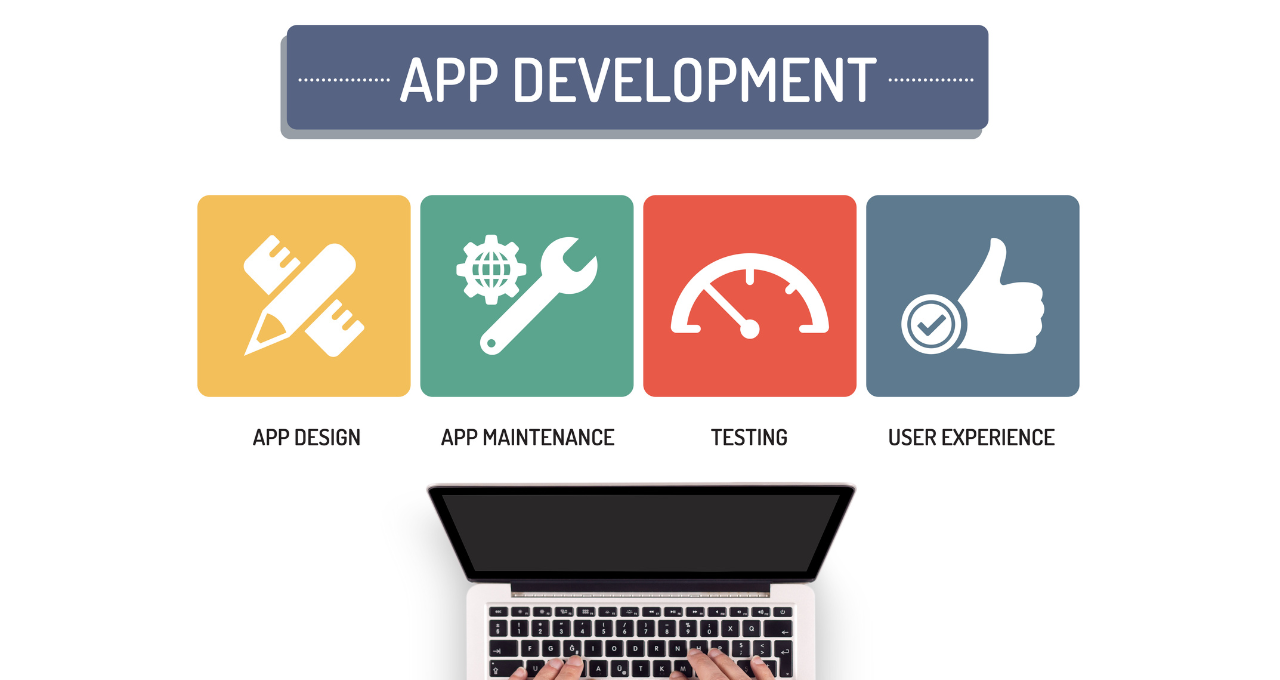With the explosive growth of smartphone usage, the demand for a skilled mobile app developer is soaring to unprecedented heights. It’s a thrilling time to be a part of this dynamic and ever-evolving industry, with projected growth rates of 30% by 2026.
Mobile applications have completely revolutionised our way of interacting with technology. It’s hard to deny the sheer importance of these apps on our daily lives.
Whether you’re a wide-eyed student eager to enter the field or a professional developer seeking fresh opportunities, we have a guide that offers an inspiring roadmap to help you launch a successful career as a mobile app developer.
What is mobile app development and why is it important?
Mobile application development is the process of constructing and designing software applications designed specifically for mobile devices. Typically, these apps require an internet connection to access resources from other computers.
And To build a mobile app, you’ll need to create software packages that can be installed on devices, including all the necessary code and assets, and rigorously test the app to ensure it works well on the intended devices. Additionally, you’ll need to create an API that enables the app to communicate with other services and retrieve information.
Mobile apps are essential for businesses as they give users access to services from various platforms, including smartphones, tablets, and wearables. Developing apps can extend market reach through various internet marketplaces such as Google Play, Blackberry, Apple App Store, Symbian, and other online platforms, as well as social media websites like Facebook, Twitter, and more.
With the increasing use of mobile devices, a mobile app has become necessary to stay competitive. Businesses can improve engagement and customer satisfaction with their mobile apps by targeting specific audiences. By designing an app tailored to the needs of a particular audience, businesses can increase their chances of success in a crowded marketplace.
In addition, mobile apps offer features such as push notifications, in-app messaging, and location-based services, which can enhance customer efficiency and effectiveness. This enables businesses to communicate with customers in real time, making it easier for customers to interact with the business and receive relevant information.
Furthermore, mobile apps enable businesses to engage with customers anytime and anywhere, providing a more personalised experience and enhancing brand loyalty.
The Different Types of Mobile Apps

Mobile apps are now crucial to our daily lives, with over 3.5 billion smartphone users worldwide. They’ve changed how we interact with businesses and services, making it easier to do the most basic tasks like ordering food or booking flights. Although every mobile app has its unique value, it’s important to recognize that there are three distinct categories of mobile apps, each with its own characteristics and features. Let’s look into the the different types of mobile apps:
Overview of Native Apps
Native apps are specifically designed for one particular operating system, such as iOS or Android. These apps can be downloaded from app stores like the Apple App Store or Google Play Store. The main advantage of native apps is their ability to function offline, as well as their familiar appearance and optimized aspect ratio.
Explanation of Hybrid Apps
Hybrid apps are quite like web apps but have an interface that looks and feels like a native app. After you install a hybrid app on your phone, its interface uses a browser inside the app to connect to the features of your device’s operating system. Essentially, hybrid apps are a combination of web and native apps that can be downloaded and installed on your device. Unlike web pages, they operate like actual apps and can work even without an internet connection.
Introduction to Web Apps
A web app is a software that runs on a web server and is accessed by users through a web browser with an internet connection. The client or user accesses the app from a remote server hosted by a third-party. Common examples of web apps include online banking, online shopping, web-based email, and online auctions.

Mobile App Development Tools and Technologies
The field of mobile app development is constantly evolving with the emergence of new tools and technologies. Picking the right tools can be crucial for the success of an app. So let’s look into some of the top mobile app development tools and technologies available today.
Programming languages used in mobile app development
To make a software application work on a computer, you must write it in a language the computer can understand. These languages are called programming languages, and there are The field of mobile app development is constantly evolving with the emergence of new tools and technologies. Picking the right tools can be crucial for the success of an app. In this article, we’ll delve into some of the top mobile app development tools and technologies that are available today.hundreds of them. Each programming language has its rules and purposes, so you need to choose the right one depending on your goal. Some languages are easier to learn, while others are designed for more specific or complex tasks. Different platforms, like iOS or Android, also require different programming languages. For example, JavaScript and HTML/CSS are two of the most popular languages among developers, with Java, Python, C++, Kotlin, and Rust also ranking high on the list.
Frameworks for mobile app development
A mobile app framework is a platform that helps developers create software, including compilers, debugging tools, and programming interfaces. Developers use the tools in the mobile app framework to make the code for their app, then use the framework to make the app work on different mobile devices, like phones and tablets. There are three mobile development frameworks: native frameworks for building on specific platforms, mobile web app frameworks, and hybrid frameworks that blend native and mobile web app capabilities. Some of the leading mobile app development frameworks include React Native, Ionic Framework, Node, Xamarin, NativeScript, Adobe PhoneGap, and Flutter.
Integrated Development Environments (IDEs)
IDEs are computer programs that help software developers work faster and more efficiently by offering a single application where they can do all of their programming work. This can include writing and editing code, compiling and deploying software, and debugging. An IDE’s main purpose is to simplify programming by offering a unified platform that integrates all necessary tools and features. Additionally, IDEs can automatically detect errors in the code, making it easier for developers to debug their work.
Software Development Kits (SDKs)
A software development kit, commonly called SDK, is a set of tools that assist developers in making software applications for a particular platform, such as a computer or mobile device. These tools usually contain libraries, code samples, and documentation that programmers can use to make their own apps or modify current ones. Developers can use pre-built components to save time and effort when creating applications with an SDK.

Backend-as-a-Service (BaaS) platforms
Backend-as-a-Service (BaaS) is a service that helps developers create applications more easily. It allows developers to focus on creating the parts of the application that users interact with (called the frontend) while letting BaaS handle the technical work of building and maintaining the parts of the application that users don’t see (called the backend). This makes it easier for developers to build applications without needing to be experts in both frontend and backend development.
User Interface (UI) design tools
User interface (UI) design is how designers create how things look on computer screens or in software programs. Designers must ensure that the things they create are easy to use and look nice for people who use them. Designers want to make the experience of using a software or computerized device enjoyable for users.
How to make an app. “Development process”
Although the process of creating a mobile app can differ from person to person, there are seven common steps that most developers will typically take. These include:
- Creating a plan for success.
- Analyzing and planning the app.
- Designing its user interface and user experience.
- Developing the app.
- Testing it to ensure functionality.
- Releasing it for use.
- Providing ongoing support while monitoring its performance.
Mobile App Development Career Path
Mobile app development is a popular career choice in Australia, with mobile app developers earning an average salary of AUD 102,000 per year, as reported by Seek. According to the Department of Employment, the industry is expected to grow significantly, with a projected 17% increase in software and application programmer jobs from 2020 to 2025. Given the increasing demand for mobile app development both locally and globally, this field offers a promising future with opportunities for innovation and growth.
Job roles in mobile app development
App Annie and the Australian Trade and Investment Commission reported that mobile app downloads in Australia grew by 5% in 2020, with consumers spending over AUD 2 billion on mobile apps. Thus, mobile app development is a popular profession with an ever-growing demand for phone apps. The job has the potential for innovation and advancement in the future. Precisely, here are the most seeked after roles in mobile app development:
Mobile app developer
Mobile App Development is a promising career choice with ample growth opportunities. CNN Money named it the Best Job in America due to a projected growth rate of 19% over the next decade and a median salary of $97,000.
A good grasp of widely-used programming languages such as C++, Java, SQL, and iOS is a must-have skill for Mobile Application Development positions. While self-taught individuals may exist, most employers prefer candidates with bachelor’s degrees in Mobile Application Development, Software Engineering, Computer Science, or a related field, such as Digital Design.
Mobile app designer
A mobile app designer is primarily responsible for crafting a mobile application’s visual design and user interface. They work closely with the development team to ensure that the app is visually appealing but also intuitive and user-friendly.
Mobile app design is a rapidly growing field thanks to the rising demand for mobile applications. As smartphones and tablets gain popularity, the need for well-designed and user-friendly mobile apps is increasing, leading to a demand for skilled mobile app designers. This career can be quite lucrative, with salaries ranging from $50,000 to over $130,000, depending on experience, location, and company. Experienced designers can advance to senior design roles or even establish their own design firms.
Mobile app tester
A mobile app tester’s primary job is to evaluate the functionality and user-friendliness of a mobile application before it’s made available to the public. This involves identifying and reporting bugs, glitches, or other issues to the development team and ensuring that the app adheres to established quality and performance standards.
Mobile app testing is critical to ensuring a stable and functional mobile application across different platforms and devices. Effective mobile app testers require strong analytical skills, problem-solving abilities, and keen attention to detail to identify and diagnose issues. As the demand for high-quality mobile apps increases, the demand for skilled mobile app testers also rises. The salary for mobile app testers varies based on location, experience, and company but generally ranges from $40,000 to $80,000 or higher.
Salaries in mobile app development
Mobile app development is a fast-growing field in Australia as more businesses and organizations adopt apps to improve their operations and customer engagement.
Salaries for mobile app developers vary based on experience and organization type. For example, on average, mobile app developers in Australia earn around AUD 92,000 annually, but experienced developers in larger organizations can earn over AUD 140,000 annually.
Startups and smaller businesses typically offer lower salaries for mobile app developers, with an average range of AUD 50,000 to AUD 80,000 per year. The location also plays a role, with larger cities offering higher salaries but higher living costs.
Mobile app development in Australia is a lucrative career with ample opportunities for growth and advancement. Skilled developers are in high demand due to the increasing need for mobile apps. Developers can increase their earning potential by gaining experience and staying up-to-date with the latest technologies and trends in the field.
Different ways to monetise mobile apps

Multiple income generation methods are available for mobile application development, which can help developers turn their passion for app development into a profitable business. Below are some of the most commonly employed ways to monetize mobile apps.
App store optimisation
The primary goal of App Store Optimization (ASO) is to attract more app downloads and users by enhancing the visibility of mobile apps on app stores like Apple App Store and Google Play. While various app monetization techniques like in-app ads, subscription models, or in-app purchases can increase revenue, their success largely depends on the app’s ability to persuade users to download and use it.
This can only be achieved if the app has a high ranking in the app store search results, where ASO plays a crucial role. By optimizing various app elements such as metadata, keywords, and reviews, ASO can enhance the app’s visibility and increase the likelihood of it being downloaded and used by more users.
Advertising
After creating a successful application, the next step is to monetize it, which involves generating revenue from the app. Then, app publishers and developers have a range of monetization methods to choose from to boost their app’s success.
The most popular method for app monetization is displaying ads for other apps, products, and services within the app and earning revenue from them. Mobile users typically prefer free apps, meaning developers cannot charge users for the app; therefore, in-app ads are a smart way to earn revenue from such apps.
In-app purchases
In the world of mobile apps, in-app purchases have gained popularity among users as a means to access additional services, content, and features. Global studies show users spend an estimated $380 billion on in-app purchases. The strategy involves offering the app for free and generating revenue through purchases made within the app. This monetization method allows users to improve their app experience by making in-app purchases.
By offering free downloads and incorporating in-app purchases, it’s possible to reach a wider audience and increase profitability if executed correctly.
Subscription models
To generate revenue using this mobile app monetization approach, users can download the app for free, but premium services inside the application are exclusively available to subscribers. To effectively execute this strategy, it is vital to convert free users into subscribers and retain existing subscribers by highlighting the benefits of updating the app to new users and consistently providing fresh content and features to current subscribers.
This model can potentially attract many free users, who can be retained within the app before eventually converting them into paying subscribers.
Hiring a Mobile App Developer

What does company consider when hiring a mobile app developer
When companies hire someone to create a mobile app, these are the crucial aspects they look for in the person they hire.
Technical expertise
When companies hire a mobile app developer, they don’t just consider their experience; they also look at their technical expertise. Developing an app involves various stages, including idea generation, design, development, testing, and deployment. Companies tend to choose developers with technical certifications or recently attended workshops. They also prefer developers with practical experience and a good knowledge of both operating systems.
Impressive portfolio
Companies looking to hire a mobile app developer usually consider their portfolio a crucial factor in decision-making. A portfolio showcases the developer’s previous work, including the app’s design, functionality, and usability. Companies can evaluate their creativity, skill level, and expertise by reviewing a developer’s portfolio. The portfolio also provides insight into the developer’s style, including their approach to problem-solving and their ability to innovate.
App designing skills
Companies generally seek out mobile app developers with strong attention to detail and a passion for great design, enabling them to create intuitive applications with seamless user experiences. As a result, developers with design experience are particularly preferred, as they are better equipped to build flaws-free apps.
Project Timeline
Meeting project deadlines is crucial for some projects, and companies want to ensure that the mobile app developer they hire can work within those timelines. As part of the hiring process, they often inquire about the developer’s previous project timelines and how long it took them to complete each project. When companies assign new projects, they typically provide a suggested timeline and use the developer’s past performance to indicate their ability to work effectively and meet the given deadlines.
Testing
Many companies prioritize hiring a mobile app developer with experience in testing applications and the ability to identify and fix potential bugs. This is an important step in the mobile app development process as it ensures a seamless user experience by detecting and resolving any issues before the app is launched.
Releasing and Post assessment
Companies seek out mobile app developers who thoroughly understand the process for submitting apps to the Google Play Store and the App Store. Additionally, it is important for developers to regularly assess the performance of their apps after they have been released on these platforms.
They must remain aware of the need for updates and new features, as failing to do so may result in a dull and unengaging user experience. Thus, to keep users interested in their apps, companies prioritize hiring developers capable of introducing new and exciting features to keep users engaged.
Questions asked during the interview process
When hiring mobile app developers, firms are cautious and ask the right questions. Some most asked questions are:
- Can you provide some examples of mobile apps you’ve developed in the past?
- What was your most challenging experience while developing a mobile app for a client?
- Which development platform would be best for our mobile app?
- Can you walk me through your development approach?
- What are your salary expectations, pricing rates, and terms?
- What sets your app development profile apart from others?
The Future of Mobile App Development
Nowadays, it’s challenging to avoid the pervasive influence of technology. Almost everyone seems to be attached to their smartphones, spending endless hours scrolling through social media or watching videos on YouTube. The mobile app development industry is thriving, with over a billion smartphones in use, and an astonishing 179 billion mobile apps are downloaded annually.
However, the surge of chatbots makes us feel a bit sad about the app-centric world we knew. The ease of booking tickets or filing complaints with just a few taps on our phones may soon be a thing of the past. As AI-powered chatbots take over, we won’t need to download countless apps since one chatbot can handle all of those tasks and more.
It’s a moment of conflict for technology enthusiasts. While we’re thrilled about what the future holds, we can’t help but feel a bit sentimental about the good old days when apps were king in the digital world.
Current trends in mobile app development
With the increasing popularity of trends like artificial intelligence and machine learning, progressive web apps, and dark mode, the world of mobile app development is evolving rapidly. Let’s dive into the current mobile application trends and the most popular mobile technology trends to keep an eye on in 2023:
- AI: Artificial Intelligence is replicating human intelligence in machines to carry out tasks that typically require human intelligence.
- Augmented and Virtual Reality: AR and VR are technologies that offer digitally enhanced real-world experiences (AR) or entirely immersive digital environments (VR). IoT
- Apps for Mobile Devices: IoT apps enable mobile devices to connect and control smart devices.
- Mobile Payment Systems: These are payment systems that allow customers to make electronic transactions through their mobile devices.
- Mobile Applications Based on Cloud Technology: These apps use cloud storage and computing to provide the functionality to users.
- 5G Wireless Connections: 5G is the fifth-generation wireless technology that provides faster internet speeds and lower latency.
- Wearable Tech’s Influence on App Development: Wearable technology has influenced app development to create unique experiences optimized for wearable devices.
- Improved Mobile Security: This refers to measures taken to protect mobile devices, apps, and data from unauthorized access or malicious attacks.
- Developing Apps for Multiple Platforms: This refers to the practice of creating apps that can run on various operating systems or platforms.
- Mobile Commerce: This refers to buying and selling goods and services through mobile devices.
- Voice Recognition Technology: This technology allows devices to understand and respond to voice commands and speech.
- Beacon Technology: Beacons are small, wireless transmitters that send signals to mobile devices for location-based services and personalized experiences.
Predictions for the future of mobile app development
The mobile app industry has grown rapidly in recent years and continuously adapts to changing user demands and technological advancements. With the rise of AI-powered and AR/VR apps, it is quite exciting to see what the future of mobile app development holds. Let’s look into some trends that we predict will shape the future of mobile app development:
- Wearable gadgets:
Wearable gadgets like smartwatches and fitness trackers provide exclusive app experiences for users. - Internet of Things and connected smart objects:
The Internet of Things (IoT) and smart objects allow for the control and connection of daily objects through mobile devices.
- Mobile commerce:
Mobile commerce enables people to buy and sell goods and services using their mobile devices.
- Motion and location sensing:
Motion and location-sensing technology allow mobile devices to track movement and location for various purposes.
- Creative mobile user experience design:
Creative mobile user experience design aims to provide engaging and distinct experiences for users of mobile applications.
- Application performance management (APM):
Application performance management (APM) focuses on improving mobile apps’ dependability and efficiency.
- Enterprise mobile management:
Enterprise mobile management involves the secure management of mobile devices and applications employees use in an organization.
Mobile App Development for different sectors
Mobile app development has completely changed how businesses interact with customers in numerous industries, such as healthcare, finance, education, and transportation. This article delves into the unique challenges and opportunities of creating apps for these sectors, providing valuable insights for both developers looking to expand their skillset and business owners interested in exploring the benefits of mobile app development.
Mobile App Development for Businesses
In today’s digital age, mobile apps are becoming increasingly vital for businesses looking to stay ahead of the curve. So let’s look into some important features that make mobile applications necessary for businesses.
- Mobile apps make it easier for businesses and customers to communicate and connect.
- Mobile apps help businesses become more well-known and recognizable.
- Mobile apps allow customers to reach out to businesses anytime, day or night.
- Mobile apps provide useful information to businesses about their customer’s behavior and preferences.
- Mobile apps can be used to promote a business and attract new customers.
- Mobile apps offer a good value for businesses as they are a relatively low-cost way to interact with customers.
Mobile App Development for Individuals
Developing apps is an opportunity for individuals to learn new skills and gain experience in software development. With app development, individuals can build customized solutions tailored to their needs.
Additionally, developing an app has the potential to generate income through app stores.
These digital marketplaces provide a platform for individuals to sell their apps to a wide range of consumers.
Mobile App Development for Entrepreneurs
Mobile app development can benefit entrepreneurs in today’s digital age. Mobile app development has become a vital tool for entrepreneurs to grow their businesses and succeed in the highly competitive marketplace by offering a direct and efficient way of connecting with customers. Let’s precisely dive into how Mobile app development can benefit entrepreneurs:
- Better customer connection: Mobile apps provide a fast and effective way for entrepreneurs to communicate with their customers, improving engagement and satisfaction.
- Quick conversions: With mobile apps, entrepreneurs can offer a seamless user experience, resulting in fast and high conversion rates.
- Customer-centric data utilization: Mobile apps can help entrepreneurs gather customer data and use it to build a customer-focused approach.
- Great marketing: Mobile apps can be a powerful marketing channel for entrepreneurs, allowing them to reach a wider audience.
- Maximum user engagement: Mobile apps allow entrepreneurs to engage with customers and build strong relationships.
- Customer loyalty programs: Entrepreneurs can use mobile apps to offer rewards and loyalty programs, increasing customer retention.
- Effective promotion: Mobile apps provide a platform for entrepreneurs to promote their businesses and attract new customers.
- Brand building: Mobile apps can help entrepreneurs establish their brand and create a positive reputation in the market.
- Always accessible: Mobile apps allow entrepreneurs to offer their products or services to customers anytime, making it convenient for customers to interact with the business.
- Cost-effective: Mobile app development is cost-effective for entrepreneurs to engage with customers and promote their businesses.
- Social media marketing: Entrepreneurs can use social media for marketing their mobile app, increasing their visibility and reach.
- Outshine competitors: With mobile apps, entrepreneurs can stand out from their competitors and stay ahead in the market.
Conclusion
To become a mobile app developer, one must possess technical proficiency, creativity, and problem-solving skills. The career prospects for mobile app developers are extensive and continuously growing, with openings in multiple sectors like healthcare, education, entertainment, and finance. Small businesses, entrepreneurs, and individuals can reap several benefits by developing mobile apps, such as better customer engagement, enhanced brand loyalty, and cost-effective marketing channels. In addition, mobile app development is exciting and fulfilling, providing various opportunities for individual and professional progress.
How to make an app FAQs
What skills are required to become a mobile app developer?
To become a mobile app developer, one must possess a set of abilities such as knowledge of programming languages for mobile devices, proficiency in cross-platform development (including Android and iOS), expertise in user interface and user experience, familiarity with cybersecurity measures, and adaptability to other business-related factors such as marketing and time management.
What are the different programming languages used in mobile app development?
In 2023, the major programming languages used in mobile application development are JavaScript, Kotlin, Java, Swift, and Dart.
What is the difference between native app development and hybrid app development?
Building mobile apps for a specific operating system, like Android or iOS, is called native app development. On the other hand, hybrid app development uses web technologies such as HTML, CSS, and JavaScript to make apps that can run on multiple platforms.
How can I gain experience in mobile app development?
To gain experience in mobile app development, take courses or certifications and make your own apps. Join open-source projects and attend events like hackathons and conferences. Think about working for a mobile app development company as an intern or employee.
What should I include in my mobile app development portfolio?
Your mobile app development portfolio should showcase your relevant work to demonstrate your skills as a developer. Include projects showing your app development proficiency, such as UI design, programming languages, and database management. Provide information about the development process, including planning, design, development, and testing. This helps potential employers or clients understand your approach and ability to follow a structured process. Include any relevant qualifications, certifications, or awards you have earned in mobile app development.
What are some useful tools for mobile app development?
Some commonly used tools for mobile app development are IDEs like Android Studio, Xcode, and Visual Studio. Popular frameworks and libraries include React Native, Xamarin, and Flutter. Design and prototyping tools like Adobe XD, Sketch, and Figma help create mockups and prototypes. Testing tools like Appium, Espresso, and XCUITest ensure the app works correctly. Version control systems like Git and Bitbucket aid developers in managing changes and collaborate with others. Cloud services such as Firebase, AWS Mobile Hub, and Azure Mobile Services provide different storage and analytics features to integrate into mobile apps.
What are some common challenges in mobile app development?
Developing mobile apps poses several challenges, such as ensuring the app works smoothly on various devices and operating systems due to platform fragmentation. Limited memory and battery life of mobile devices can also affect app performance. Mobile apps are vulnerable to security breaches and hacking attempts since they handle sensitive user data. Developing a user-friendly and visually appealing interface is also a daunting task. Keeping pace with the rapidly evolving mobile technology industry can be challenging too. Integrating mobile apps with backend systems like databases and APIs is also challenging due to programming language and technology disparities.
What types of careers are available in mobile app development?
Careers in mobile app development include jobs like iOS Developer, Mobile Engineer, Android Developer, Application Developer, Software Engineer, Full Stack Engineer, and Web Developer.
What is the average salary for a mobile app developer?
According to Payscale, the average annual salary of a mobile app developer in Australia is around AUD 78,000. However, the salary can differ between AUD 50,000 to AUD 120,000 annually, depending on profile, experience, location, and skills.
How can I prepare for a job interview in mobile app development?
You can prepare for a job interview in mobile app development by researching the company’s products, services, and mission to show your interest and tailor your answers. Review your relevant project portfolio and be ready to discuss your role and the challenges you faced. Refresh your technical skills and practice coding challenges to increase your confidence and skill level. Prepare relevant questions to ask the interviewer to show your interest and determine if the company is a good fit. Dress appropriately, arrive early, and be confident and personable during the interview while remaining professional.

Passionate engineer who loves talking about Machine learning and ways to improve Software development practices. CEO and Director of Software Engineering of Wolfmatrix.

